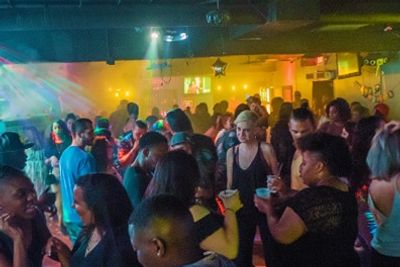By KJ Philp, September 2018 Issue.
Audrey Corley’s experience in the local bar scene began 25 years ago, when she landed her first job as a barback.
“I was 18, and I fell in love with it … I moved around as a bartender,” she said, “and eventually started as a bar manager at A League of our Own in Phoenix. I knew from very early on that I wanted to be a bar owner.”
In college, she and her basketball teammates often discussed Corley’s dream of owning a bar – specifically a bar named Boycott, which stands for boycotting the norm.
On July 16, 2003, her vision came to life as a Boycott feature night at BZ Grill. Fast forward 15 years, and Boycott has existed in various forms and at several Valley addresses, and on July 13, Corley and the Boycott team celebrated the brand’s quinceañera in the space it’s called its permanent home since March 2017.
Echo caught up with Corley, Boycott’s founder and creator, to find out more about this milestone and here’s what she had to say.
Echo: Take us back to the very first Boycott night. What was it like? What were your goals and how did you measure success at the time?
Corley: There was a void in the community for an upscale place for women at that time. I had just left managing the E Lounge, and I had nowhere to go out … and meet other women … I went to the owner of BZ grill and asked him if he would let me do a Boycott feature night that I had envisioned since college. He agreed, and I started promoting the night through friends and passing out cards for the event … I was nervous and excited, but I felt like the community was ready for something different. On that first night, we had 452 men and women who showed up. It was so busy … [that] I knew we had something special.
Echo: How did that night differ – or not – from your goals and measurement of success today?
Corley: My goals and vision for Boycott are similar to when it began. I want to create a welcoming space in our community for all people – except rude people. This is encapsulated in the chalkboard we have hanging near the bar that says, “All Are Welcome.” I see longevity as an indication of success. However, I see the relationships with my customers and community as the goal and measure of success. When people keep coming back because they feel at home and can be themselves, I have been successful.
Echo: Why is Boycott an important space within Phoenix’s landscape of LGBTQ bars?
Corley: Boycott is an important space within Phoenix’s landscape because it has tried to connect to the local community regardless of their [identity]. I try to genuinely set Boycott as a landmark for Melrose and Phoenix rather than only for the LGBTQ community. This … has also contributed to my continued sustainability.
Echo: On that note, how would you describe Boycott’s vibe to someone who may not be familiar with it?
Corley: Boycott is a space for everyone. The crowd is always diverse, and I try to make sure everyone has a good time.
Echo: In our January 2016 issue, we addressed the closure of several LGBTQ bars and, 31 issues later we’re celebrating additions and milestones of our community bars – to what do you attribute this shift?
Corley: I think there has been a significant change in American society when it comes to acceptance of the LGBTQ community. There is still certainly a long way to go, and there is still serious prejudice in society. However, I think the shift in demand for LGBTQ spaces in Phoenix … is an indication of more acceptance by society, rather than less … This growing acceptance, however, makes it more difficult to be a bar that is exclusive to one portion of the population.
Echo: Do you see your role with Boycott as an opportunity to mentor the next generation of Phoenix’s LGBTQ bar owners and operators?
Corley: Al Kern and Rhonda Walden were both mentors for me as I started trying to own my own bar [and] I see my position at Boycott as an opportunity to mentor the next generation. I’m here to impact as many lives as I can, and I am always looking for ways to help other LGBTQ owners and operators.
Echo: Looking forward, what are some of your future goals for Boycott?
Corley: I would like to expand and have a patio at Boycott. I would like to own an additional bar, flower shop, and have a family.
Echo: We cant wrap this up without giving you the chance to shoutout out the rest of the teams that made this milestone happen! Go for it ...
Corley: I would like to thank everyone who has been from the start and everyone who has ever come to an event. I want to thank Scott and Tony from Club Vibe, Bobby C., Pierre Coleman, the DJs in the community, and all the Boycott bar staff. I also want to especially thank my family and, my right hand, Nicole Ennis. Without these people, none of this would have been possible.
The VENUS Second Annual Labor Day Weekend All White LGBTQ Party at Boycott Bar
9 p.m.-2 a.m. Sept 1-2
4301 N. Seventh Ave., Phoenix
